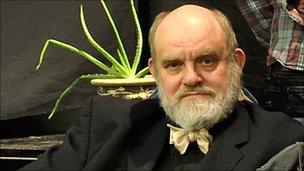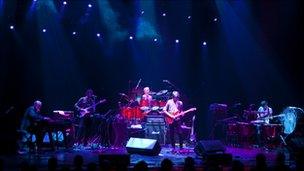The Enid say the future is dependent on fans' patronage
- Published

Robert John Godfrey formed The Enid in 1974 at Finchden Manor experimental school in Kent
One of Britain's biggest cult bands are back in Suffolk having spent a decade based in Clare establishing their own independent model for survival.
The Enid were initially signed to major record labels, but they now rely on their fans to help fund them.
Founder Robert John Godfrey said: "Bands that want a long career have to make a marriage with their fans - good old fashioned patronage."
The band are performing at The Apex, external in Bury St Edmunds on Saturday, 12 March.
The Enid's 1970s albums, which are usually categorised as progressive or symphonic rock (although it is not a term the band are happy with), came out on EMI and then Pye Records.
But by the end of the decade the music scene had changed, punk and new wave were in, and they fell out of favour.
Change or leave
Robert, who is a classically-trained pianist, said: "We were simply given a choice - change into something more commercial or leave.
"Obviously there was only one option I could take because I wouldn't have known how to change myself into something they wanted."
While the band wrote lengthy complex tunes, they would often encore with a version of the Sex Pistols' Pretty Vacant and they once joined fellow Finchden Manor schoolboy turned BBC presenter Tom Robinson on stage to play his big hit 2-4-6-8 Motorway.
"John Peel used to refer to us, rather pejoratively, as A level rock after having to preside over three frankly unbelievable encores at the Reading Festival," said Robert.
"But he was actually quite right. The Enid's ability to appeal was in offering a safe haven for girls and boys who didn't like punk because of its total lack of musicality."
So this first phase of the band ground to a halt and Robert and guitarist Stephen Stewart moved from Hertfordshire to rent Claret Hall Farm near Clare where they set up The Lodge recording studio.

The Enid are currently a five-piece band with drummer Dave Storey returning to the fold
Dilapidated and Wilde
"The farmhouse was fairly dilapidated," said Robert. "It wasn't nicely furnished with chintzy curtains. It was dank with no central heating, but it was quite large.
"There must have been little change since the immediate post-war years, but the pubs around Clare stayed open until five in the morning."
At first they concentrated on the studio where one of their clients, Kim Wilde, recorded her early hits.
In 1982 the pair reactivated The Enid on an independent DIY basis which operated under the radar or with little interest from the music press and mainstream radio.
It was during this period that The Stand was created - a sort of fan club within a fan club whereby supporters helped pay for the band's recordings in return for discounts, exclusive recordings and other benefits.
This model continues today with the current five-piece line up which still records at The Lodge studio which moved to the band's new home in Northampton.
'A tryst'
Fans pay £25 a year to join an organisation called The Enidi.
Robert sees parallels between this and other acts who sell directly to their fans.
"Our latest album Journey's End took hundreds of creative hours costing thousands of pounds.
"Yet we live in a world where most people don't want to pay for music anymore, particularly when they can download it for free from the internet.
"The only real opportunity that exists for any band with big ideas is to make a tryst with their fans, because there aren't any record companies out there who are prepared to spend money on works of art.
"This model, which I see being taken up by the likes of Radiohead and others, is the one of the future.
"We realised that our fans were not punters or consumers, but patrons, friends and contributors without whom The Enid could not exist.
"It's the Motorhead/Lemmy model - the relationship between the band and its fans is one of the most powerful ones in existence and it's served him extremely well."
Leaving Suffolk
The Enid left the Clare farmhouse in 1989 after Robert and Stephen parted company.
"I was in debt, Steve was gone, I was living in it by myself, I wanted a change and the landlords wanted their house back.
"I had a housekeeper who was one of my fans and she was from the Hell's Angels community.
"She looked after me and she found a place near Northampton, so this is where I ended up."
While on the subject of Suffolk, I asked Robert, 63, about one of the county's most musical famous sons, the composer Benjamin Britten.
"I met him, but I wasn't a friend or one of 'Britten's boys'.
"I found myself in a circle when I was at the Royal College of Music in London with Kit Lambert, who went on to manage The Who and founded Track Records, and he was friends with all these people.
"In some ways I think Britten is the greatest composer that we've ever had, but I also think he lacked the courage to be what he could have been - our Shostakovich.
"The great works like the War Requiem were the exception and I think he devoted a lot of his creative talent to things that interested him and that he could manage.
"He didn't rise to the challenge, whereas Vaughn Williams, who didn't have anything like the potential for greatness that Britten had, nevertheless still wrote a large series of symphonies.
"I just wish Britten had really gone for it."
- Published23 February 2011